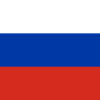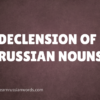Пяткой в грудь
Today, we’re going to learn some new colloquial Russian expressions. Although they’re completely different in meaning, they all have on thing in common — they all mention some body part.
Приве́т, друзья́,
Hi friends,
Сего́дня мы с ва́ми вы́учим не́сколько но́вых разгово́рных ру́сских выраже́ний. Хотя́ по смы́слу все они соверше́нно ра́зные, о́бщего ме́жду ни́ми то, что все они упомина́ют каку́ю-ли́бо из часте́й те́ла.
Today, we’re going to learn some new colloquial Russian expressions. Although they’re completely different in meaning, they all have on thing in common — they all mention some body part.
Начнём с заголо́вка сегодняшего подка́ста: пя́ткой в грудь. Наве́рное, суть э́того выраже́ния про́ще объясни́ть на приме́ре:
Let’s start with the title of this podcast: “beating one’s chest with one’s heel”. It may be easier to explain the meaning of this expression with an example:
Ещё вчера́ он бил себя́ пя́ткой в грудь, утвержда́я, что его́ да́нные ве́рны на 100%, а сего́дня он без зазре́ния со́вести поменя́л курс ре́чи на 180 гра́дусов.
Yesterday he was beating his chest with his heel, claiming that his data was 100% correct, but today he did a complete 180 without batting an eyelash.
Т.е. бить себя́ пя́ткой в грудь зна́чит кля́сться, дока́зывать свою́ правоту́, убежда́ть кого́-ли́бо в чём-ли́бо.
In other words, “beating yourself in the chest with your heel” means to swear in order to prove a point or try to convince someone of something.
Ещё мы говори́м с пе́ной у рта. Обы́чно с пе́ной у рта что́-то дока́зывают, хотя́ быва́ют и други́е сочета́ния:
We also say “with a foam around one’s mouth” — usually when someone is trying to prove something, although other combinations are possible:
Он с пе́ной у рта нам дока́зывал, что он прав, а мы идио́ты.
He was foaming at the mouth trying to prove to us that he was right and we were idiots.
Сле́дующее выраже́ние – гора́ с плеч – опи́сывает облегче́ние, кото́рое лю́ди испы́тывают по́сле избавле́ния от трево́г, забо́т и́ли пережива́ний. Обы́чно гора́ с плеч “сва́ливается”, но мо́жно и сократи́ть:
The next expression means “[to take] a mountain off one’s shoulders” and describes the relief people experience after getting rid of anxiety or worry. This mountain usually “falls” off the shoulders, but you can also shorten the expression:
У меня́ по́сле таки́х новосте́й гора́ с плеч.
That news took a weight/load off my shoulders.
Я сра́зу почу́вствовала, как у меня́ гора́ с плеч свали́лась.
I immediately felt as if a mountain was lifted off my shoulders.
Сле́дующее выраже́ние – верте́ться на языке́. Когда́ что́-то ве́ртится на языке́, зна́чит ты отча́янно пыта́ешься вспо́мнить чьё-то и́мя, како́е-то сло́во и́ли выраже́ние, но оно́ ника́к не всплыва́ет в па́мяти. Т.е. слова́ как бу́дто пыта́ются вы́рваться у тебя́ изо рта, но мозг акти́вно сопротивля́ется предоста́вить тебе́ их произноше́ние. Наприме́р:
The next expression means “to be spinning on one’s tongue”. This means you can’t seem to recall something you’re desperately trying to remember like someone’s name, a word or expression. In other words, it’s as if the words are trying to come out of your mouth, but your brain is actively refusing to give them form. For example:
Его́ и́мя верте́лось у меня́ на языке́, но я ни в каку́ю не могла́ его́ вспо́мнить.
His name was on the tip of my tongue, but I couldn’t recall it.
Кста́ти, ни в каку́ю зна́чит “ника́к”.
By the way, “ни в какую” means “at all”.
И после́днее на сего́дня выраже́ние – губа́ не ду́ра. Так обы́чно говоря́т о челове́ке, кото́рый зна́ет чего́ хо́чет и хо́чет не ма́лого. Иногда́ э́то выраже́ние употребля́ется в отноше́нии того́, кто “сли́шком замечта́лся”.
And the last expression for today means “someone’s lip is not stupid”. This is what they usually say about a person who knows what they want and dreams big. Sometimes this expression is used in relation to someone who “dreams too much”.
Наприме́р:
For example:
– Я плани́рую попроси́ть повыше́ние зарпла́ты на 50%.
– А у тебя́ губа́ не ду́ра.
– I plan to ask for a 50% raise.
– Wow, you don’t mess around!
Кста́ти, э́то выраже́ние, на са́мом де́ле – часть посло́вицы: губа́ не ду́ра, язы́к – не лопа́тка: зна́ет, где го́рько, где сла́дко.
By the way, this expression is actually a part of a proverb: the lip isn’t stupid, the tongue isn’t a little shovel: it knows where it’s bitter and where it’s sweet.
Ну вот и всё на сего́дня. Жела́ю вам никогда́ не име́ть горы́ на ва́ших плеча́х, а та́кже всегда́ знать, чего́ и́менно вы хоти́те от жи́зни и успе́шно э́того добива́ться.
And that’s it for today. I hope you never have a mountain on your shoulders, and also always know exactly what you want from life and get it.
Всем пока́ и до ско́рой встре́чи!
Bye, everyone! See you soon!
Many thanks to Uly Marrero for the help with translation.
Subscribe to our basic newsletter and receive notifications about new episodes of Very Much Russian podcast.
Or subscribe to our premium newsletter to receive both the basic newsletter and all our previous podcast episodes, one by one, on a regular basis.
Today's vocabulary
- губа не дура
Russian idioms[gu-BA nye DU-ra]lit.: the lip is not stupid Said about a person who knows what he/she wants and dreams big. - пяткой в грудь
Russian idioms[PYAT-kaî v grut']lit.: with a heel into the chest "Kicking yourself in the chest with your heel" means swearing, proving your case, trying to convince someone of something. - ни в какую
Conversational Russian[nee f ka-KU-yu]at all - вертеться на языке
Russian idioms[veer-TYE-tsa na ya-zy-KYE]lit.: to spin on the tongue to be on the tip of one's tongue - с пеной у рта
Russian idioms[s PYE-naî u rta]lit.: with foam around the mouth Used when someone is eagerly trying to prove something. - гора с плеч
Russian idioms[ga-RA s plyech]lit.: a mountain off the shoulders Describes the relief that people experience after getting rid of anxiety, concerns, or worries










